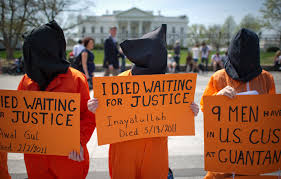U.S. enters the ‘black list’ for not closing Guantanamo
Thursday, April 24th, 2014 12:30:24 by Kashif Mirza
The criteria by which the Inter-American Human Rights Commission decides whether or not to include any of its members from countries that do not fully guarantee the exercise of fundamental rights in the hemisphere States are four serious violations of institutional democracy – including abuse of power and coups; total or partial suspension of the rights under the Convention and the American Declaration; massive, gross and systematic violation of human rights by the state; and the occurrence of institutional crises, omissions and breaches that violate the enjoyment of human rights. In its 2013 annual report, the Commission mentioned for the first time to the United States within the overview of issues and challenges facing the region, because of its handling of the Guantanamo detention center. USA is now on the blacklist shared with Ecuador, Dominican Republic, Cuba, Honduras and Venezuela.
The opinion of the Commission is that Washington has failed in its duty to guarantee the right to freedom of detainees in Guantanamo Bay, located on the southeastern coast of Cuba. From the very opening of the detention center in early 2002, the Commission has recommended immediate closure and has on several occasions unsuccessfully sought permission to visit the base and freely interview detainees. In May 2013, the Commission reiterated its call to end the indefinite detention of prisoners at Guantanamo, calling it a “flagrant violation of international law” and “a form of cruel, inhuman and degrading treatment.” Three months earlier, several of the detainees began a hunger strike to demand a change of their arrest and underwent gavage treatments that the commission described as “unjustifiable”.
The Commission is currently preparing a thematic report on the situation of the prisoners in Guantánamo, where they promises to address “the recent events related to the conditions of detention, access to legal representation and the constraints of shipments” among other issues. To these ends, during the last half of 2013, the committee convened several public hearings in which the United States did not present arguments, under the excuse that the government shutdown in October – 2013 – prevented the government from preparing defense.
In its annual monitoring work the panorama of human rights in the hemisphere, the Inter-American Commission on Human Rights has also held in the new law adopted by Ecuador and Dominican Republic that injures, respectively, the right of citizens to free speech and nationality. In the case of Ecuador, the report refers to the Communications Law signed by President Rafael Correa in June 2013, which imposes greater restrictions and obligations on social media, “that could severely impede the exercise of right to freedom of expression and generate a strong chilling effect, incompatible with a democratic society.”
In the case of Dominican Republic, the Commission remains vigilant and concerned about the judgment in October 2013 by the Constitutional Court stripped the nationality of thousands of Dominicans of foreign descent, born in the territory of the Republic from 1929; to the Commission, this statement has a “discriminatory effect” it mainly affects people of Haitian descent, “deprived of nationality retroactively” and “creates statelessness” in the case of those who are not considered citizens of any State.
In the individual assessment of the situation of human rights, Cuba, Venezuela and Honduras are the three countries with the focus this time and the committee has devoted a special report. Like every year, the situation of human rights in Cuba continues to occupy a prominent place in the Commission report.
The Commission stresses the legal responsibility of the Cuban State in this matter, even though Havana is not involved in the Organization of American States (OAS) in 1962, in principle, by a resolution adopted by the OAS and since 2009, own will the Castro government. In this sense, the document states: “The restrictions on political rights of association, freedom of expression and dissemination of ideas, lack of choices, lack of independence of the judiciary and restrictions on freedom of movement they have for decades a permanent and systematic violation of human rights of the citizens in Cuba. During 2013, the available information suggests that the general situation of human rights has not changed. “In the existing situation, cases of severe repression against human rights defenders on the island are added, and discrimination and violence against the LGBT community – lesbian, gay bisexual and transgender. As usual, the Commission sent these comments to Cuba and Cuba did not respond.
In Honduras, the committee continues to monitor structural failures in justice, security, marginalization and discrimination for decades have affected the human rights of its inhabitants. But also concerned about the fragility of democratic institutions and continued episodes of violation of human rights that have been documented since the coup that ousted President Manuel Zelaya in June 2009, have further complicated the already difficult situation.
The subordination of the judiciary from the executive, the abuse of criminal law, crime, the systematic denial of political rights, violence in prisons and threats to freedom of expression and human rights defenders are the problems more serious than the Commission continues to identify in Venezuela in its 2013 report. biggest regret and the commission at this time, is the complaint by Caracas of the American Convention on Human Rights, effective September 10, 2013, and in the opinion of the Commission “limits the resources available to Venezuelan citizens to defend themselves in the context of human rights violations.”
Short URL: https://www.newspakistan.pk/?p=43195

















